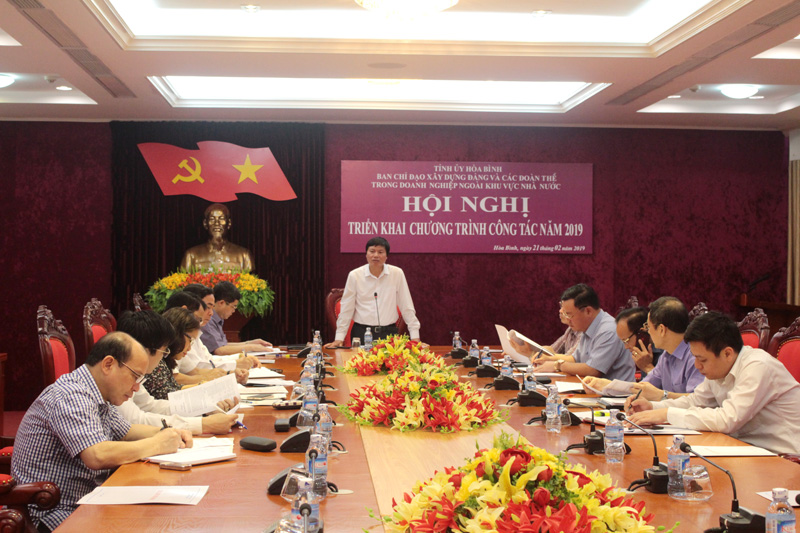
(HBO) – The Hoa Binh steering board for the building of Party units and unions in non-State businesses held a meeting on February 21 to review its performance in 2018 and launch tasks for this year. Permanent Vice Secretary of the provincial Party Committee and Chairman of the provincial People’s Council Tran Dang Ninh, who is also head of the steering board, chaired the event.
Permanent
Vice Secretary of the provincial Party Committee and Chairman of the provincial
People’s Council Tran Dang Ninh addresses the meeting.
From November 2017 to October 2018, 22 people
were admitted to the Party and two Party cells were established in businesses.
That raised the number of non-State firms with Party units to 51 with 662 Party
members, including five grassroots Party organisations, 30 grassroots Party
cells, and 16 Party cells under communal-level Party organisations.
While 28 new grassroots trade unions with 3,897
members were set up, four grassroots units of the Ho Chi Minh Communist Youth
Union (HCYU) with 82 members came into being. At present, there are 202
grassroots trade unions with 22,035 members and 21 HCYU units with 917 members
in non-State businesses across Hoa Binh province.
Two Women’s Union branches with 111 members in
private companies and cooperatives have also maintained their activities.
Addressing the meeting, Tran Dang Ninh,
Permanent Vice Secretary of the provincial Party Committee, Chairman of the
provincial People’s Council and head of the steering board, recognised the
results of the steering board and its member sectors’ activities in 2018.
He asked the member sectors, basing on their
assigned tasks, to actively direct subordinate agencies and units to have a
good grasp of the local situation; step up the monitoring and promotion of the Directive
No. 38 implementation; and conduct communications, guide the establishment of
and organise activities of Party units and unions appropriate to each
business’s conditions.
To the firms already having Party units and other unions, it is necessary to
help training persons in charge of Party and union-related work and reform
their activities.
The official assigned the Organisation Board of
the provincial Party Committee to coordinate with relevant agencies in proposing
rewards for collectives and individuals with outstanding accomplishments in the
building of the Party and unions in enterprises./.
The Standing Board of the Hoa Binh provincial Party Committee has agreed in principle on a proposal by the Standing Board of the Party Committee of Hoa Binh city to gather feedback on the city’s 1:2000 zoning plan, which forms part of its broader urban development strategy.
Hoa Binh province has made notable progress in public administration reform and digital government development, with the satisfaction index among citizens and businesses reaching over 84%, according to recent government evaluations.
Thanks to great efforts by local authorities in recent times, the governance and public administration performance of Mai Chau district has been significantly improved.
In the afternoon of June 6, the Party Committee, the People's Council, the People's Committee and the Fatherland Front of Lac Son district solemnly held a meeting to celebrate the 139th anniversary of the district's founding (1886–2025) and the 79th anniversary of the establishment of the district's Party Committee (1946–2025). There was the attendance of Mr. Bui Van Thang, the Vice Chairman of the Provincial People's Council; Mr. Quach Tat Liem, the Vice Chairman of the Provincial People's Committee; Ms. Dang Bich Ngoc, the Deputy Head of the National Assembly Delegation of the province; as well as the former leaders of the province and district through various periods, who are the natives of the district.
Implementing the Politburo’s Resolution No. 57-NQ/TW on breakthroughs in science – technology, innovation, and digital transformation is a golden opportunity for the northern mountainous province of Hoa Binh to renew growth model, improve competitive edge and shorten digital gap.
Resolution 57-NQ/TW, issued by the Politburo on December 22, 2024, identifies sci-tech, innovation, and digital transformation as strategic breakthroughs to build a developed and prosperous nation. In Hoa Binh province, this spirit is not just a slogan, it’s being put into action through concrete initiatives that form a "new development triangle”: digital citizenship, digital economy, and digital administration.



